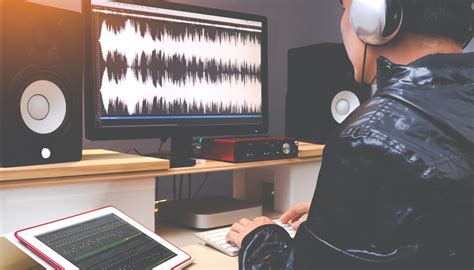The audio industry is booming, with new technologies and applications emerging all the time. This has created a growing demand for skilled professionals in all aspects of audio production, from recording and mixing to sound design and engineering.

What is Audio Production?
Audio production encompasses the entire process of creating, recording, editing, and mixing audio content. This can include anything from podcasts and audiobooks to music and sound effects. Audio producers work with a variety of equipment and software to create high-quality audio that meets the specific needs of their clients.
Careers in Audio Production
There are many different career paths available in audio production. Some of the most common include:
- Audio engineers record, mix, and master audio content. They work in a variety of settings, including recording studios, live sound venues, and broadcast studios.
- Sound designers create and manipulate sounds for use in film, television, video games, and other media. They use a variety of techniques to create realistic and immersive звуковые среды.
- Audio producers oversee the entire audio production process, from planning and budgeting to recording and mixing. They work closely with clients to ensure that the final product meets their expectations.
Education and Training
There are a variety of ways to get started in a career in audio production. Many audio professionals have a bachelor’s or master’s degree in audio engineering, music production, or a related field. However, it is also possible to learn the skills necessary for a career in audio production through online courses, workshops, and apprenticeships.
Salary and Job Outlook
According to the U.S. Bureau of Labor Statistics, the median annual salary for audio engineers was $76,160 in May 2021. The lowest 10 percent earned less than $33,060, and the highest 10 percent earned more than $141,000.
The job outlook for audio engineers is expected to grow faster than average over the next ten years. This is due to the increasing demand for audio content in a variety of industries, including entertainment, broadcasting, and healthcare.
Common Mistakes to Avoid
There are a few common mistakes that people make when entering the audio production industry. These include:
- Not getting enough training. It is important to have a solid foundation in audio production before you start working on professional projects. This will help you avoid making costly mistakes and ensure that you are able to produce high-quality audio.
- Not networking. The audio production industry is a small world, and it is important to network with other professionals to get your foot in the door. Attend industry events, join online forums, and reach out to people who are already working in the field.
- Not keeping up with the latest technology. The audio production industry is constantly evolving, so it is important to stay up-to-date on the latest technologies and trends. This will help you produce the best possible audio and stay ahead of the competition.
How to Get Started
If you are interested in a career in audio production, there are a few things you can do to get started. First, get some training. This can be done through a formal education program or through online courses and workshops. Second, start building your portfolio. Record and mix your own audio content, and share it with others. Third, network with other audio professionals. Attend industry events and join online forums. Finally, keep up with the latest technology. Read industry publications and attend webinars to learn about the latest trends.
Conclusion
A career in audio production can be both rewarding and challenging. With the right training and experience, you can create high-quality audio content that meets the needs of your clients. If you are passionate about sound, then a career in audio production may be the right path for you.
Additional Resources
- Audio Engineering Society
- National Association of Broadcasters
- Society of Motion Picture and Television Engineers
